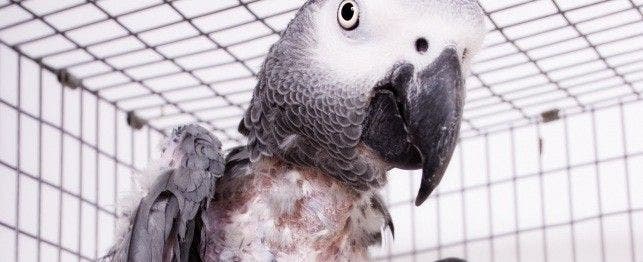
When Your Parrot Chews His Feathers
It’s a frustrating situation: You fall in love with a beautiful bird and bring him home to be your pet. You play with him, learning all about his behavior and vocalization, and you admire his lovely blend of colors and the beauty of his feathers. Then one day, for no apparent reason, your little companion begins to pull his beautiful feathers out.
This behavior is called feather picking, and it is one of the most frustrating and difficult conditions of caged birds. It is an obsessive, destructive behavior pattern in birds in which their feathers are methodically pulled out or in some way damaged. Your bird may break off parts of the feathers or pull them out entirely. This behavior may also damage the skin and cause wounds. If your bird continues to pull the feathers, the feather follicles might become damaged so that the feathers will no longer grow. Damage to the skin can also result in infections and become life threatening.
Your bird’s feathers have a variety of functions. He uses them to fly, to regulate his temperature, to protect him from the environment and to attract the opposite sex. He cares for his feathers by a process called “preening.” When your bird preens, he uses his beak to condition and waterproof his feathers and to remove the sheaths through which all contour and flight feathers emerge. He runs his beak through the feathers, putting them into position and distributing oil that he gets from the uropygial gland at the base of his tail.
A multitude of causes have been blamed for the frustrating condition, yet few of these offer any consistent path to resolution. Essentially, any situation that produces a physiological or psychological disturbance can result in your bird plucking out his own feathers.
Veterinary Care
Because many different conditions can lead to feather picking, in most cases your veterinarian will need to employ a number of different diagnostic tests to find the cause. Frequently, more than one factor contributes to the problem, so finding one possible cause does not mean that it is the only cause. However, being thorough offers the greatest assurance that resolution can be achieved.
A thorough history including your bird’s diet, the type of housing, typical toys and exposure to other animals is a valuable first step in finding the possible cause of a feather picking episode. Your veterinarian may also perform a variety of blood tests including a CBC (complete blood count), blood chemistries, antibody measurements, and tests for certain specific diseases or toxins. Your veterinarian may also perform an analysis of skin scrapings, feather samples, and skin biopsies, and radiography, ultrasonography, or endoscopy may be the only means of discovering a cause of feather picking.
Home Care
Occasionally, an episode of feather picking is actually exacerbated by an owner trying to resolve the problem. Birds are much like children and will sometimes prefer negative attention to no attention at all. Your attempts to distract your pet bird from feather picking may actually become entertaining to the bird. Your first responsibility, therefore, is NOT to draw attention to the picking in front of your bird.
Poor diets can either cause or contribute to plumage problems. Be sure your pet bird is on an appropriately balanced diet.
You can also experiment with toys and objects that the bird finds more appealing than its own feathers, and maintain regular grooming in the form of showers and baths to decrease your bird’s preoccupation with its plumage.
If true self-mutilation becomes a factor, call your veterinarian immediately. Birds, especially cockatoos, have been known to eat into the flesh of their chest during an episode of feather picking.